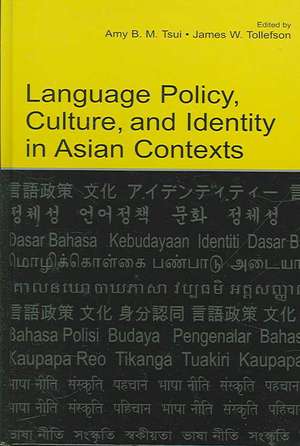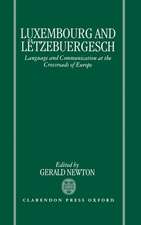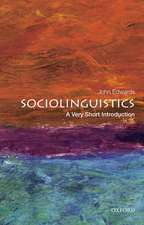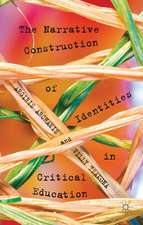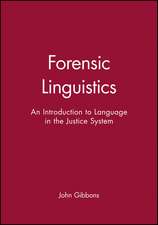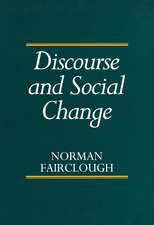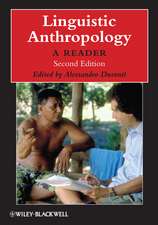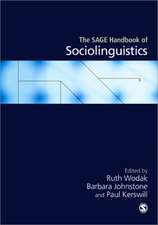Language Policy, Culture, and Identity in Asian Contexts
Editat de Amy B.M. Tsui, James W. Tollefsonen Limba Engleză Hardback – 11 oct 2006
- Globalization and its Impact on Language Policies, Culture, and Identity
- Language Policy and the Social (Re)construction of National Cultural Identity
- Language Policy and Language Politics: The Role of English.
Language Policy, Culture, and Identity in Asian Contexts will interest scholars and research students in the areas of language policy, education, sociolinguistics, applied linguistics, and critical linguistics. It can be adopted in graduate and advanced undergraduate courses on language policy, language in society, and language education.
Preț: 1002.68 lei
Preț vechi: 1222.78 lei
-18% Nou
Puncte Express: 1504
Preț estimativ în valută:
191.88€ • 199.11$ • 160.38£
191.88€ • 199.11$ • 160.38£
Carte tipărită la comandă
Livrare economică 17-31 martie
Preluare comenzi: 021 569.72.76
Specificații
ISBN-13: 9780805856934
ISBN-10: 0805856935
Pagini: 294
Dimensiuni: 152 x 229 x 21 mm
Greutate: 0.52 kg
Ediția:1
Editura: Taylor & Francis
Colecția Routledge
Locul publicării:Oxford, United Kingdom
ISBN-10: 0805856935
Pagini: 294
Dimensiuni: 152 x 229 x 21 mm
Greutate: 0.52 kg
Ediția:1
Editura: Taylor & Francis
Colecția Routledge
Locul publicării:Oxford, United Kingdom
Public țintă
ProfessionalCuprins
Contents: Preface. A.B.M. Tsui, J.W. Tollefson, Language Policy and the Construction of National Cultural Identity. Part I: Globalization and Its Impact on Language Policy, Culture, and Identity. K. Hashimoto, Japan’s Language Policy and the “Lost Decade”. Y. Sungwon, Globalization and Language Policy in South Korea. M.K. David, S. Govindasamy, The Construction of National Identity and Globalization in Multilingual Malaysia. P.G-L. Chew, Remaking Singapore: Language, Culture, and Identity in a Globalized World. T. Clayton, Transition, Culture, and Language in Cambodia. Part II: Language Policy and the (Re)Construction of National Cultural Identity. A.B.M. Tsui, Language Policy and the Social Construction of Identity: The Case of Hong Kong. M. Saxena, Multilingual and Multicultural Identities in Brunei Darussalam. R.A. Benton, Mauri or Mirage? The Status of the Mäori Language in Aotearoa New Zealand in the Third Millennium. Part III: Language Policy and Language Politics: The Role of English. R.K. Agnihotri, Identity and Multilinguality: The Case of India. S.K. Sonntag, Change and Permanence in Language Politics in Nepal. T. Rahman, The Role of English in Pakistan With Special Reference to Tolerance and Militancy. T. Hossain, J.W. Tollefson, Language Policy in Education in Bangladesh. J.W. Tollefson, A.B.M. Tsui, Issues in Language Policy, Culture, and Identity.
Recenzii
"The book is certainly a must-read for anyone who is interested in issues in language policies and practices in Asian countries. It is a great sourcebook that may be used in graduate and undergraduate courses on language policy, language in society and language education.... The detail of discussion makes this book an extremely useful reference for those involved in language policy issues." -- Yasemin Kirkgoz, Linguist List, 5/14/2007
The issues raised in Language Policy, Culture, and Identity in Asian Contexts should be of interest to students of (critical) applied linguistics as well as to students of nationalism. By situating national language policies in their complex sociopolitical settings, the book provides compelling analyses of some of the paradoxes engendered in forming national cultural identities via language and through identifying stakeholders, their (conflicting) interests, and the identity construction and negotiation processes at work. Linguists and language planners in education should benefit immensely by reading these case studies of various Asian countries and their recent language planning and management efforts." -- Saud Alazzam-Alwidyan, TESL-EJ, September 2008, Volume 12, Number 2
"LPCIx is an important addition to studies on globalization, language policies, and national identities in Asia. It provides a comprehensive and focused investigation of the complex relationships between language policies, cultures, and identities that so far have been infrequently and/or inadequately covered in the existing literature. It also provides issues, agendas, and avenues, as well as theoretical and methodological tools, for further inquiries into these issues." -- Journal of Language, Identity, & Education, January 1, 2009
"The dichotomy and complex interplay between internationalization/globalization and nationalization/localization and the subsequent impact on culture and identity in Asian countries have long needed to be worked on. Given that this has been done in the varied sociopolitical and cultural contexts of various Asian countries makes this a valuable volume."—Saran Kaur Gill, Universiti Kebangsaahn, Malaysia
"... a timely and highly relevant volume.... It is clear that it will make a significant contribution to knowledge and understanding of the complex relationships between language policy, culture, and identity.... The volume is distinctive in its focus on Asian contexts. This is a real strength."—Adrian Blackledge, University of Birmingham, United Kingdom
"This book pioneers an exploration of the impact of language policy and cultural identities...It is clear that this is a critical book in language policy and identity...a trailblazer in the field...This book should inspire Western people to reflect on their own language policies."--PsycCRITIQUES, July 11, 2007, Vol. 52
The issues raised in Language Policy, Culture, and Identity in Asian Contexts should be of interest to students of (critical) applied linguistics as well as to students of nationalism. By situating national language policies in their complex sociopolitical settings, the book provides compelling analyses of some of the paradoxes engendered in forming national cultural identities via language and through identifying stakeholders, their (conflicting) interests, and the identity construction and negotiation processes at work. Linguists and language planners in education should benefit immensely by reading these case studies of various Asian countries and their recent language planning and management efforts." -- Saud Alazzam-Alwidyan, TESL-EJ, September 2008, Volume 12, Number 2
"LPCIx is an important addition to studies on globalization, language policies, and national identities in Asia. It provides a comprehensive and focused investigation of the complex relationships between language policies, cultures, and identities that so far have been infrequently and/or inadequately covered in the existing literature. It also provides issues, agendas, and avenues, as well as theoretical and methodological tools, for further inquiries into these issues." -- Journal of Language, Identity, & Education, January 1, 2009
"The dichotomy and complex interplay between internationalization/globalization and nationalization/localization and the subsequent impact on culture and identity in Asian countries have long needed to be worked on. Given that this has been done in the varied sociopolitical and cultural contexts of various Asian countries makes this a valuable volume."—Saran Kaur Gill, Universiti Kebangsaahn, Malaysia
"... a timely and highly relevant volume.... It is clear that it will make a significant contribution to knowledge and understanding of the complex relationships between language policy, culture, and identity.... The volume is distinctive in its focus on Asian contexts. This is a real strength."—Adrian Blackledge, University of Birmingham, United Kingdom
"This book pioneers an exploration of the impact of language policy and cultural identities...It is clear that this is a critical book in language policy and identity...a trailblazer in the field...This book should inspire Western people to reflect on their own language policies."--PsycCRITIQUES, July 11, 2007, Vol. 52
Notă biografică
James W. Tollefson, Amy B.M. Tsui
Descriere
Bringing together scholarship on issues relating to language, culture, and identity, with a special focus on Asian countries, this volume makes an important contribution in terms of analyzing and demonstrating how language is closely linked with crucial social, political, and economic forces, particularly the tensions between the demands of globalization and local identity.
